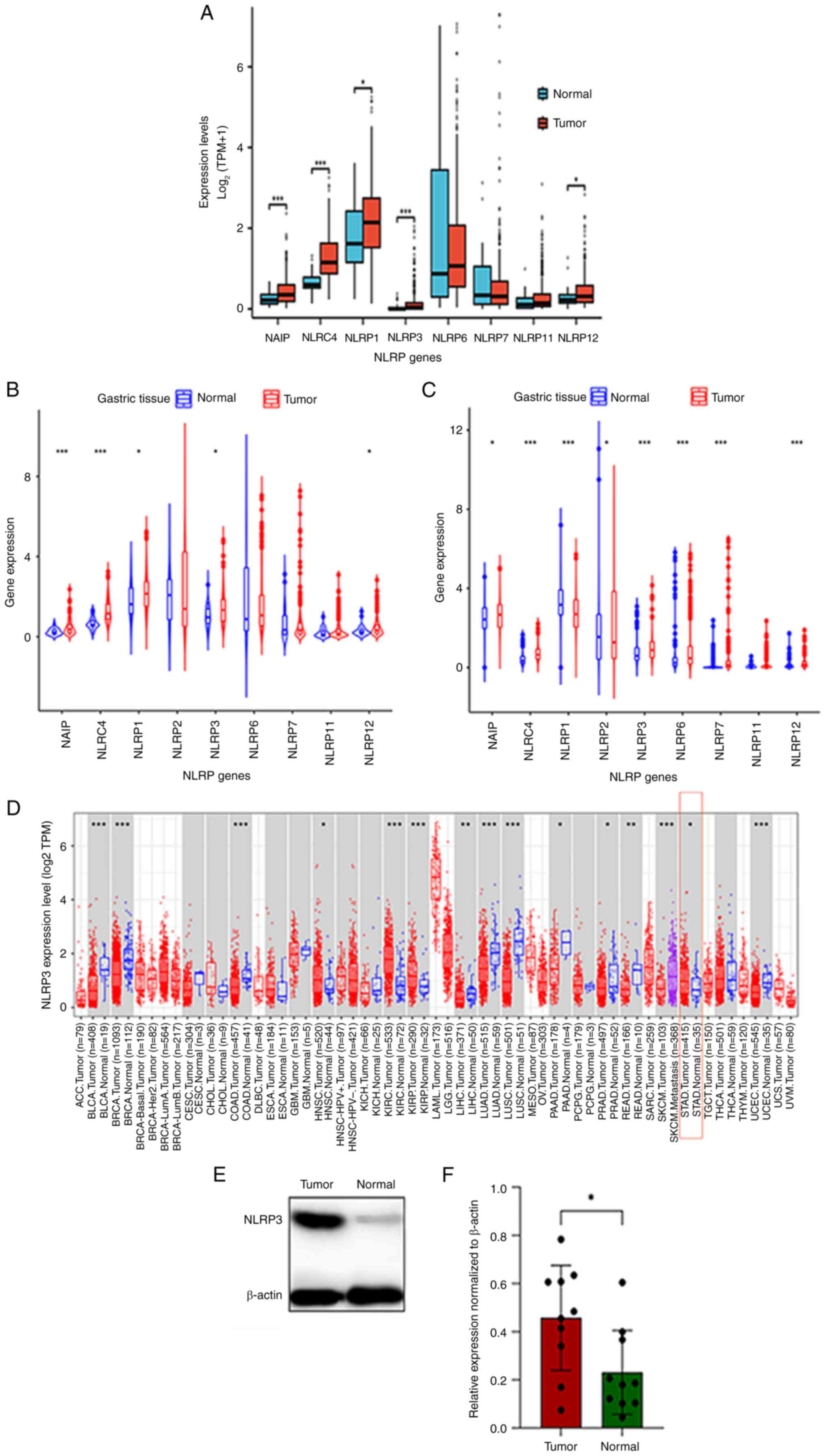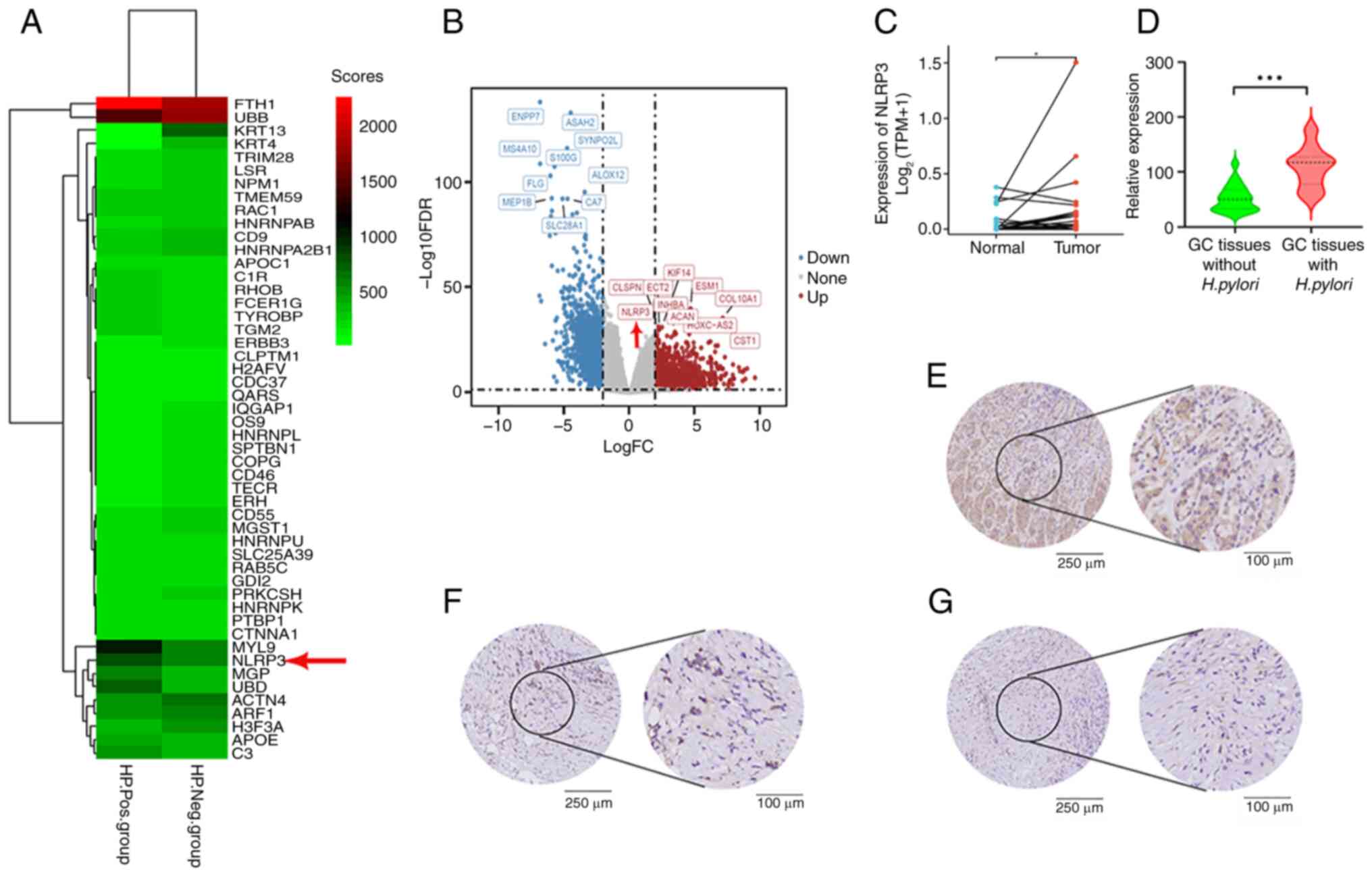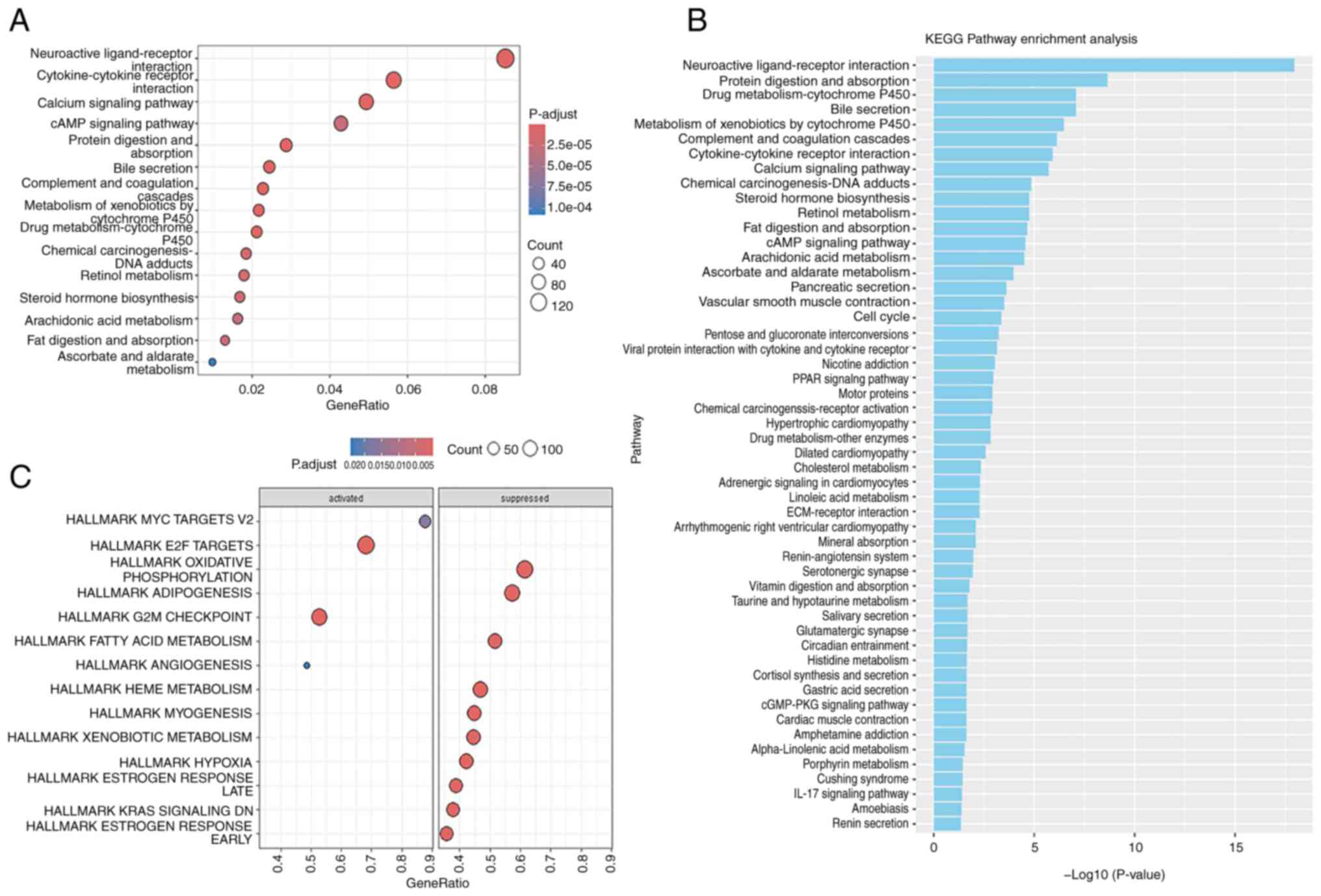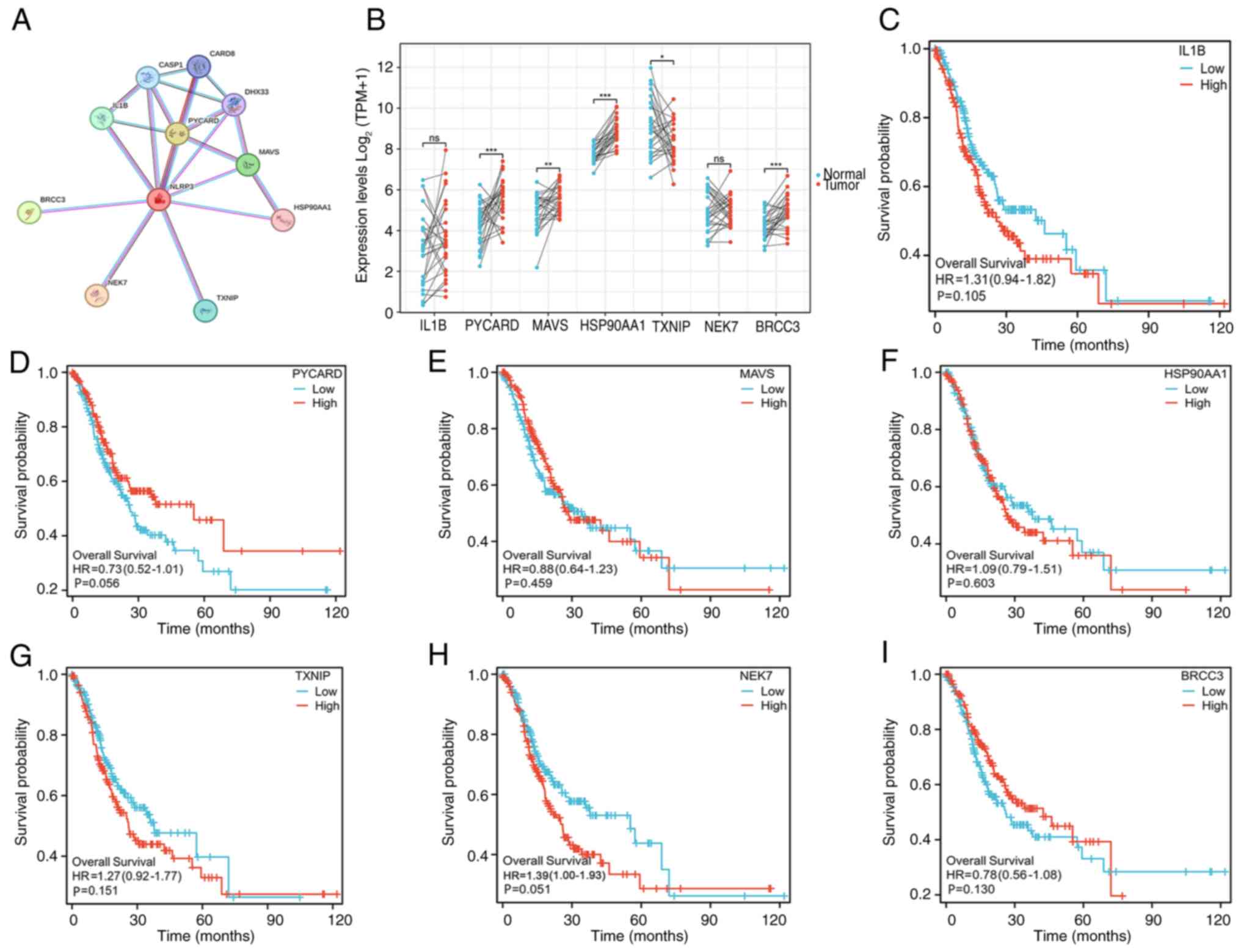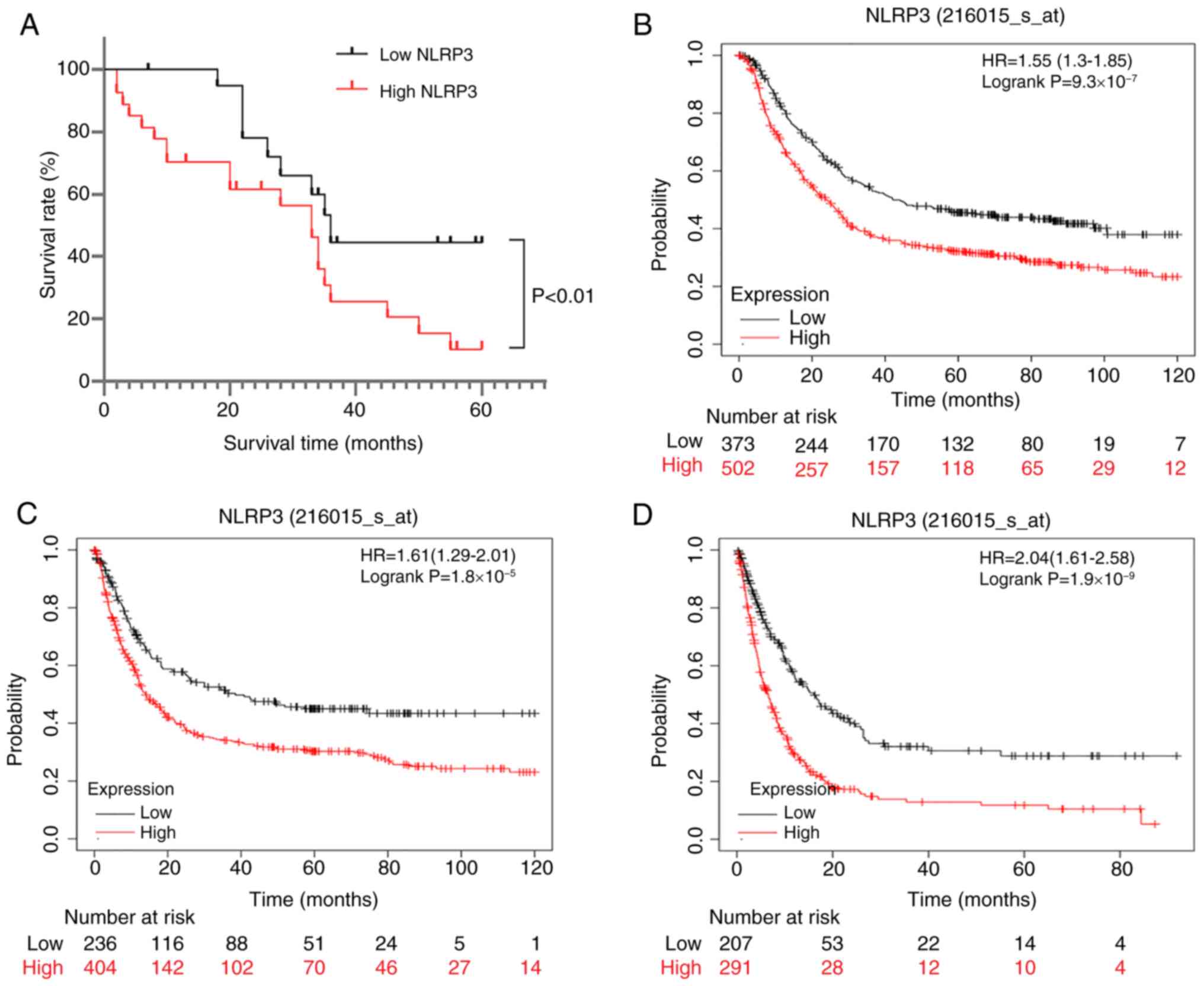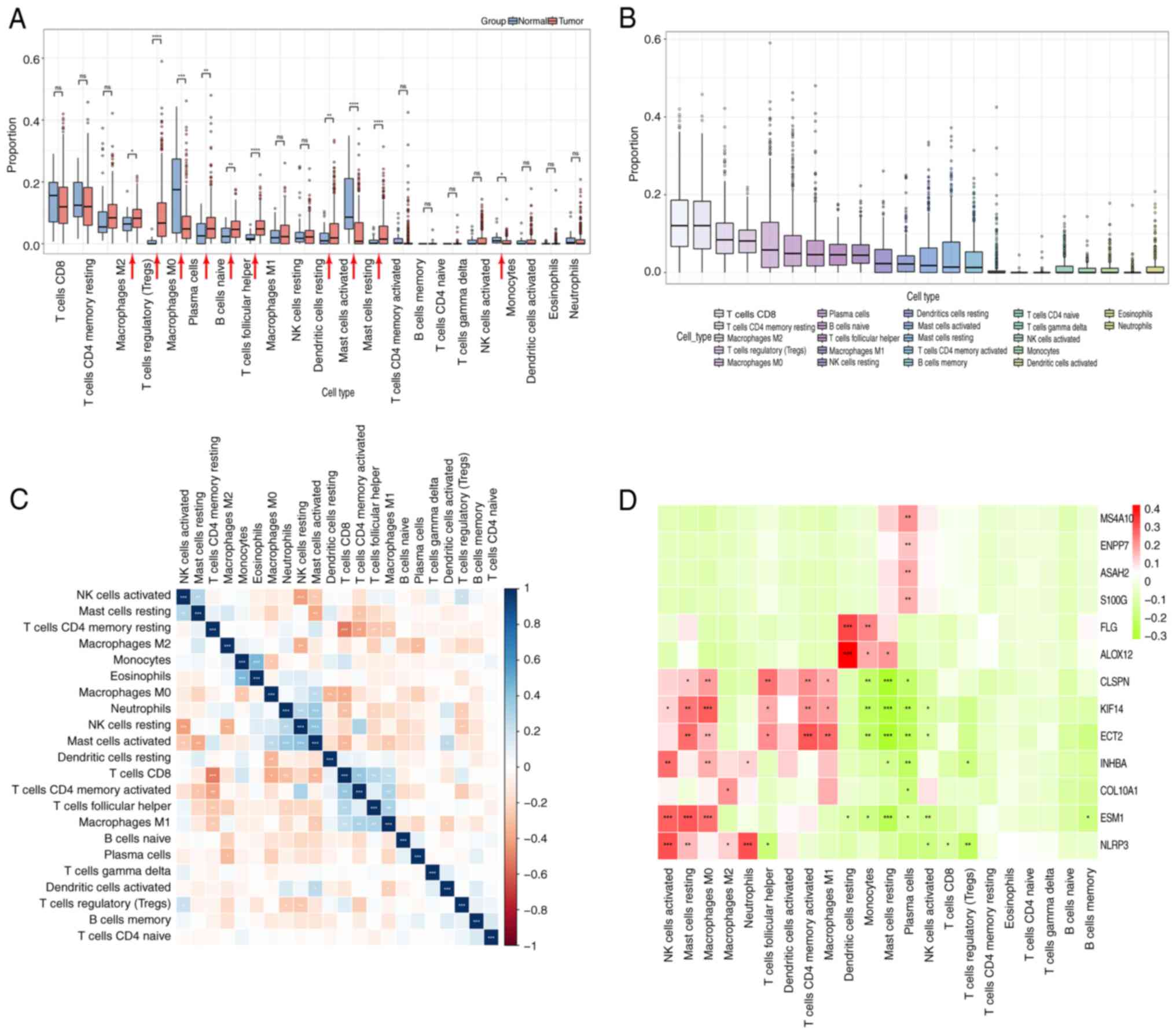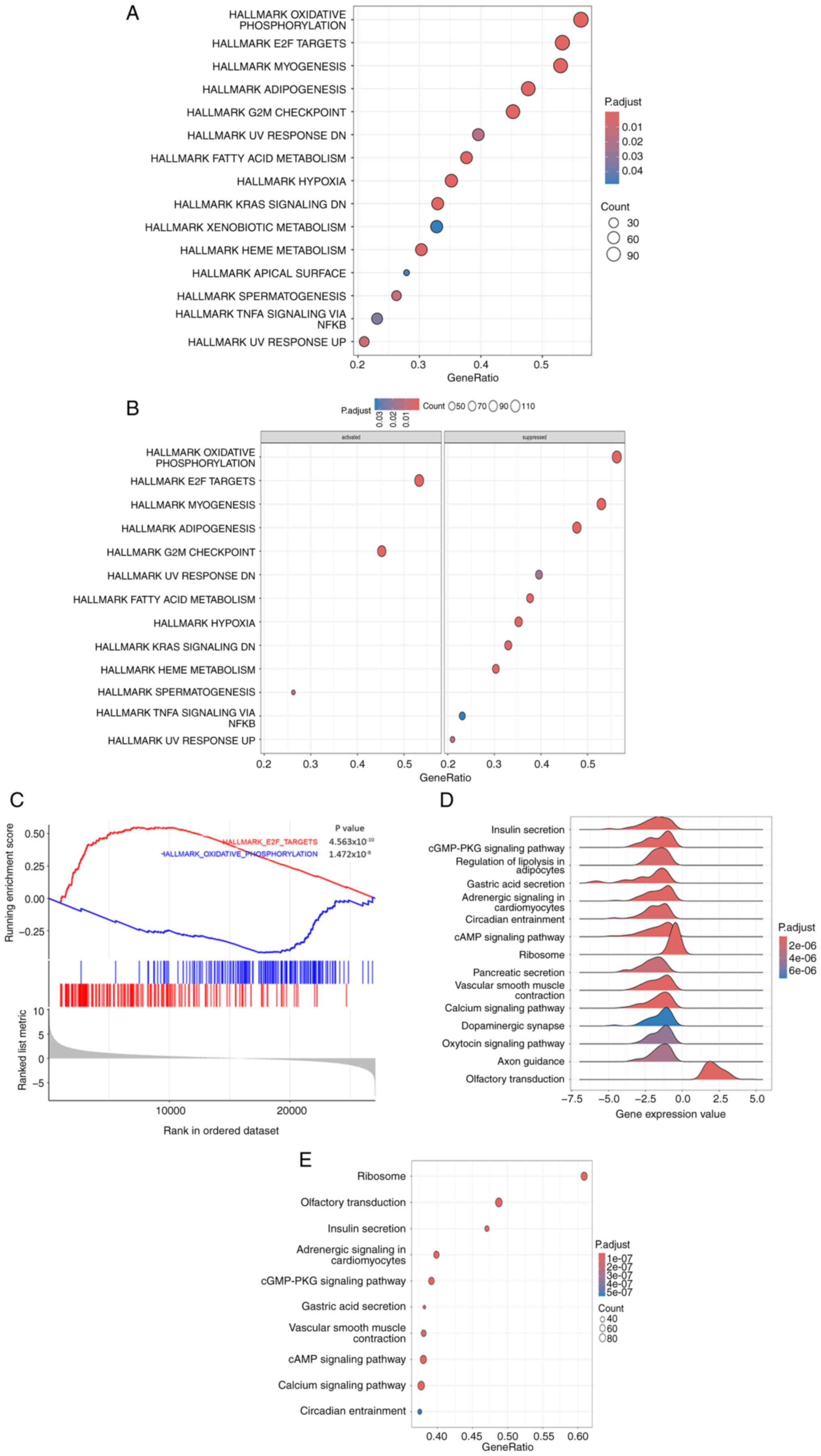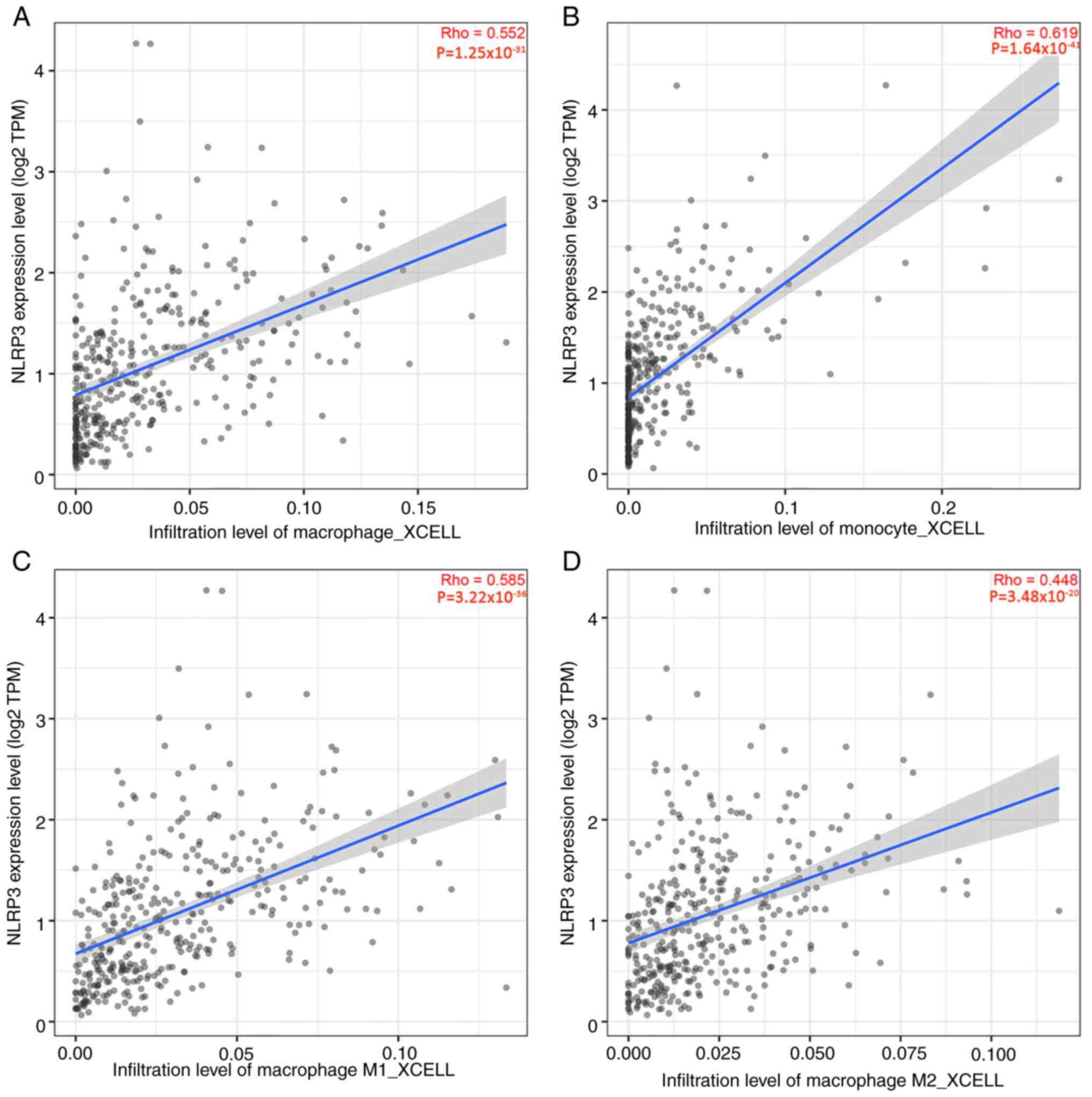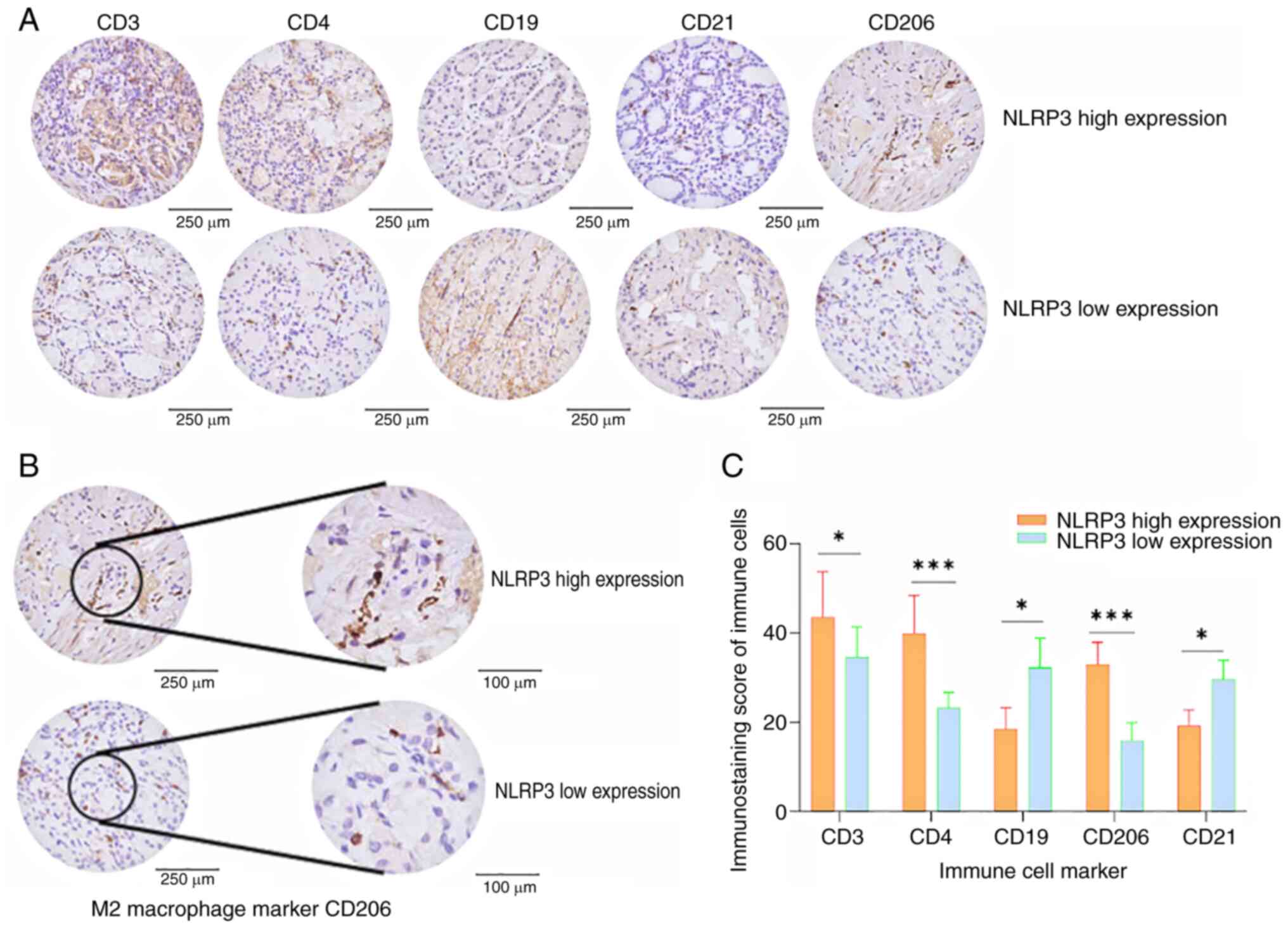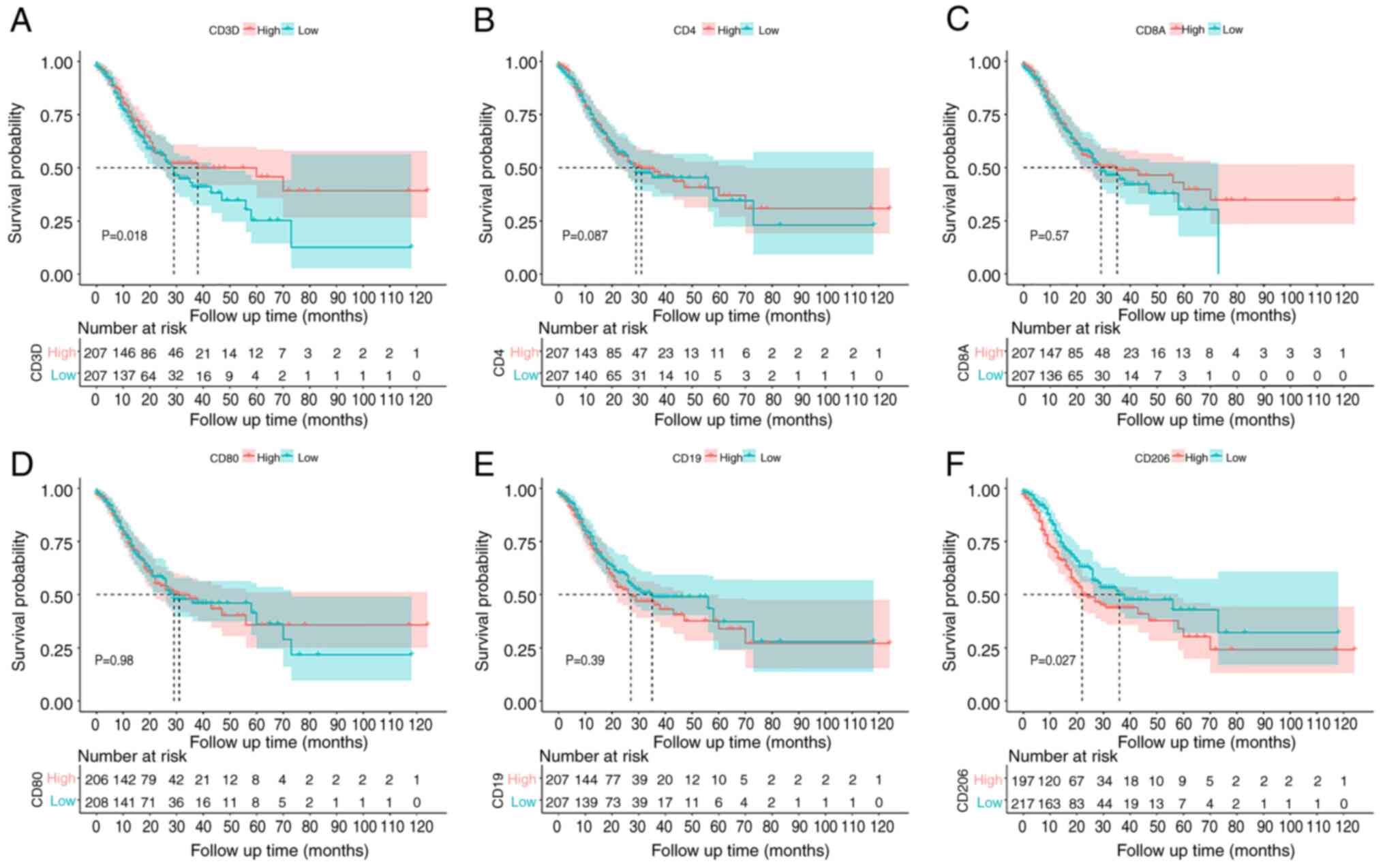|
1
|
Heuvers ME, Wisnivesky J, Stricker BH and
Aerts JG: Generalizability of results from the national lung
screening trial. Eur J Epidemiol. 27:669–672. 2012. View Article : Google Scholar : PubMed/NCBI
|
|
2
|
Billan S, Kaidar-Person O and Gil Z:
Treatment after progression in the era of immunotherapy. Lancet
Oncol. 21:e463–e476. 2020. View Article : Google Scholar : PubMed/NCBI
|
|
3
|
Shaopeng Z, Yang Z, Yuan F, Chen H and
Zhengjun Q: Regulation of regulatory T cells and tumor-associated
macrophages in gastric cancer tumor microenvironment. Cancer Med.
13:e69592024. View Article : Google Scholar : PubMed/NCBI
|
|
4
|
Zhai Y, Liu X, Huang Z, Zhang J, Stalin A,
Tan Y, Zhang F, Chen M, Shi R, Huang J, et al: Data mining combines
bioinformatics discover immunoinfiltration-related gene SERPINE1 as
a biomarker for diagnosis and prognosis of stomach adenocarcinoma.
Sci Rep. 13:13732023. View Article : Google Scholar : PubMed/NCBI
|
|
5
|
Kao KC, Vilbois S, Tsai CH and Ho PC:
Metabolic communication in the tumour-immune microenvironment. Nat
Cell Biol. 24:1574–1583. 2022. View Article : Google Scholar : PubMed/NCBI
|
|
6
|
Chen F, Chen N, Gao Y, Jia L, Lyu Z and
Cui J: Clinical progress of PD-1/L1 inhibitors in breast cancer
immunotherapy. Front Oncol. 11:7244242022. View Article : Google Scholar : PubMed/NCBI
|
|
7
|
Chen X, Zhang W, Yang W, Zhou M and Liu F:
Acquired resistance for immune checkpoint inhibitors in cancer
immunotherapy: Challenges and prospects. Aging (Albany NY).
14:1048–1064. 2022. View Article : Google Scholar : PubMed/NCBI
|
|
8
|
Wen H, Miao EA and Ting JP: Mechanisms of
NOD-like receptor-associated inflammasome activation. Immunity.
39:432–441. 2013. View Article : Google Scholar : PubMed/NCBI
|
|
9
|
Mitchell PS, Sandstrom A and Vance RE: The
NLRP1 inflammasome: New mechanistic insights and unresolved
mysteries. Curr Opin Immunol. 60:37–45. 2019. View Article : Google Scholar : PubMed/NCBI
|
|
10
|
Kufer TA and Sansonetti PJ: NLR functions
beyond pathogen recognition. Nat Immunol. 12:121–128. 2011.
View Article : Google Scholar : PubMed/NCBI
|
|
11
|
Arfsten H, Cho A, Prausmüller S, Spinka G,
Novak J, Goliasch G, Bartko PE, Raderer M, Gisslinger H, Kornek G,
et al: Inflammation-based scores as a common tool for prognostic
assessment in heart failure or cancer. Front Cardiovasc Med.
8:7259032021. View Article : Google Scholar : PubMed/NCBI
|
|
12
|
Yong X, Tang B, Li BS, Xie R, Hu CJ, Luo
G, Qin Y, Dong H and Yang SM: Helicobacter pylori virulence
factor CagA promotes tumorigenesis of gastric cancer via multiple
signaling pathways. Cell Commun Signal. 13:302015. View Article : Google Scholar : PubMed/NCBI
|
|
13
|
Hu Q, Zhao F, Guo F, Wang C and Fu Z:
Polymeric nanoparticles induce NLRP3 inflammasome activation and
promote breast cancer metastasis. Macromol Biosci. 17:17002732017.
View Article : Google Scholar
|
|
14
|
Zhang X, Li C, Chen D, He X, Zhao Y, Bao
L, Wang Q, Zhou J and Xie Y: H. pylori CagA activates the
NLRP3 inflammasome to promote gastric cancer cell migration and
invasion. Inflamm Res. 71:141–155. 2022. View Article : Google Scholar : PubMed/NCBI
|
|
15
|
Allen IC, TeKippe EM, Woodford RM, Uronis
JM, Holl EK, Rogers AB, Herfarth HH, Jobin C and Ting JP: The NLRP3
inflammasome functions as a negative regulator of tumorigenesis
during colitis-associated cancer. J Exp Med. 207:1045–1056. 2010.
View Article : Google Scholar : PubMed/NCBI
|
|
16
|
Dupaul-Chicoine J, Arabzadeh A, Dagenais
M, Douglas T, Champagne C, Morizot A, Rodrigue-Gervais IG, Breton
V, Colpitts SL, Beauchemin N and Saleh M: The Nlrp3 inflammasome
suppresses colorectal cancer metastatic growth in the liver by
promoting natural killer cell tumoricidal activity. Immunity.
43:751–763. 2015. View Article : Google Scholar : PubMed/NCBI
|
|
17
|
Chang HR, Nam S, Kook MC, Kim KT, Liu X,
Yao H, Jung HR, Lemos R Jr, Seo HH, Park HS, et al: HNF4α is a
therapeutic target that links AMPK to WNT signalling in early-stage
gastric cancer. Gut. 65:19–32. 2016. View Article : Google Scholar : PubMed/NCBI
|
|
18
|
Oh SC, Sohn BH, Cheong JH, Kim SB, Lee JE,
Park KC, Lee SH, Park JL, Park YY, Lee HS, et al: Clinical and
genomic landscape of gastric cancer with a mesenchymal phenotype.
Nat Commun. 9:17772018. View Article : Google Scholar : PubMed/NCBI
|
|
19
|
Li T, Fan J, Wang B, Traugh N, Chen Q, Liu
JS, Li B and Liu XS: TIMER: A web server for comprehensive analysis
of tumor-infiltrating immune cells. Cancer Res. 77:e108–e110. 2017.
View Article : Google Scholar : PubMed/NCBI
|
|
20
|
Elbehiry A, Marzouk E, Aldubaib M,
Abalkhail A, Anagreyyah S, Anajirih N, Almuzaini AM, Rawway M,
Alfadhel A, Draz A and Abu-Okail A: Helicobacter pylori
infection: Current status and future prospects on diagnostic,
therapeutic and control challenges. Antibiotics (Basel).
12:1912023. View Article : Google Scholar : PubMed/NCBI
|
|
21
|
Kushima R: The updated WHO classification
of digestive system tumours gastric adeno-carcinoma and dysplasia.
Pathologe. 43:8–15. 2022. View Article : Google Scholar : PubMed/NCBI
|
|
22
|
Livak KJ and Schmittgen TD: Analysis of
relative gene expression data using real-time quantitative PCR and
the 2(−Delta Delta C(T)) method. Methods. 25:402–408. 2001.
View Article : Google Scholar : PubMed/NCBI
|
|
23
|
Yu G, Wang LG, Han Y and He QY:
clusterProfiler: An R package for comparing biological themes among
gene clusters. OMICS. 16:284–287. 2012. View Article : Google Scholar : PubMed/NCBI
|
|
24
|
RStudio Team R Studio. Integrated
Development for R. RStudio, Inc.; Boston, MA: 2015, http://www.rstudio.com/
|
|
25
|
Ghazi BK, Bangash MH, Razzaq AA, Kiyani M,
Girmay S, Chaudhary WR, Zahid U, Hussain U, Mujahid H, Parvaiz U,
et al: In silico structural and functional analyses of NLRP3
inflammasomes to provide insights for treating neurodegenerative
diseases. Biomed Res Int. 23:98190052023. View Article : Google Scholar : PubMed/NCBI
|
|
26
|
An S, Li X, Li B and Li Y: Comprehensive
analysis of epigenetic associated genes with differential gene
expression and prognosis in gastric cancer. Comb Chem High
Throughput Screen. 26:527–538. 2023. View Article : Google Scholar : PubMed/NCBI
|
|
27
|
Shen Y, Qian L, Luo H, Li X, Ruan Y, Fan
R, Si Z, Chen Y, Li L and Liu Y: The significance of NLRP
inflammasome in neuropsychiatric disorders. Brain Sci. 12:10572022.
View Article : Google Scholar : PubMed/NCBI
|
|
28
|
Moon SW, Son HJ, Mo HY, Yoo NJ and Lee SH:
Somatic mutation of NLRP genes in gastric and colonic cancers.
Pathol Oncol Res. 27:6073852021. View Article : Google Scholar : PubMed/NCBI
|
|
29
|
Shadab A, Mahjoor M, Abbasi-Kolli M,
Afkhami H, Moeinian P and Safdarian AR: Divergent functions of
NLRP3 inflammasomes in cancer: A review. Cell Commun Signal.
21:2322023. View Article : Google Scholar : PubMed/NCBI
|
|
30
|
Kim J and Bae JS: Tumor-associated
macrophages and neutrophils in tumor microenvironment. Mediators
Inflamm. 2016:60581472016. View Article : Google Scholar : PubMed/NCBI
|
|
31
|
Bruchard M, Mignot G, Derangère V, Chalmin
F, Chevriaux A, Végran F, Boireau W, Simon B, Ryffel B, Connat L,
et al: Chemotherapy-triggered cathepsin B release in
myeloid-derived suppressor cells activates the Nlrp3 inflammasome
and promotes tumor growth. Nat Med. 19:57–64. 2013. View Article : Google Scholar : PubMed/NCBI
|
|
32
|
Karki R and Kanneganti TD: Diverging
inflammasome signals in tumorigenesis and potential targeting. Nat
Rev Cancer. 19:197–214. 2019. View Article : Google Scholar : PubMed/NCBI
|
|
33
|
Lin C, He H, Liu H, Li R, Chen Y, Qi Y,
Jiang Q, Chen L, Zhang P, Zhang P, et al: Tumour-associated
macrophages-derived CXCL8 determines immune evasion through
autonomous PD-L1 expression in gastric cancer. Gut. 68:1764–1773.
2019. View Article : Google Scholar : PubMed/NCBI
|
|
34
|
Huo J, Wu L and Zang Y: Development and
validation of a robust immune-related prognostic signature for
gastric cancer. J Immunol Res. 2021:55543422021. View Article : Google Scholar : PubMed/NCBI
|
|
35
|
Tang X, Guo T, Wu X, Gan X, Wang Y, Jia F,
Zhang Y, Xing X, Gao X and Li Z: Clinical significance and immune
infiltration analyses of the cuproptosis-related human copper
proteome in gastric cancer. Biomolecules. 12:14592022. View Article : Google Scholar : PubMed/NCBI
|
|
36
|
Du Z, Xiao Y, Deng G and Song H, Xue Y and
Song H: CD3+/CD4+ cells combined with myosteatosis predict the
prognosis in patients who underwent gastric cancer surgery. J
Cachexia Sarcopenia Muscle. 15:1587–1600. 2024. View Article : Google Scholar : PubMed/NCBI
|
|
37
|
Shi W, Wang Y, Xu C, Li Y, Ge S, Bai B,
Zhang K, Wang Y, Zheng N, Wang J, et al: Multilevel proteomic
analyses reveal molecular diversity between diffuse-type and
intestinal-type gastric cancer. Nat Commun. 14:8352023. View Article : Google Scholar : PubMed/NCBI
|
|
38
|
Khan M, Lin J, Wang B, Chen C, Huang Z,
Tian Y, Yuan Y and Bu J: A novel necroptosis-related gene index for
predicting prognosis and a cold tumor immune microenvironment in
stomach adenocarcinoma. Front Immunol. 13:9681652022. View Article : Google Scholar : PubMed/NCBI
|
|
39
|
Zhao S, Wu Y, Wei Y, Xu X and Zheng J:
Identification of biomarkers associated with CD8+ T cells in
coronary artery disease and their pan-cancer analysis. Front
Immunol. 13:8766162022. View Article : Google Scholar : PubMed/NCBI
|
|
40
|
Zhang F and Luo H: Diosmetin inhibits the
growth and invasion of gastric cancer by interfering with M2
phenotype macrophage polarization. J Biochem Mol Toxicol.
37:e234312023. View Article : Google Scholar : PubMed/NCBI
|
|
41
|
Qu Y, Wang X, Bai S, Niu L, Zhao G, Yao Y,
Li B and Li H: The effects of TNF-α/TNFR2 in regulatory T cells on
the microenvironment and progression of gastric cancer. Int J
Cancer. 150:1373–1391. 2022. View Article : Google Scholar : PubMed/NCBI
|
|
42
|
Jian F, Yanhong J, Limeng W, Guoping N,
Yiqing T, Hao L and Zhaoji P: TIMP2 is associated with prognosis
and immune infiltrates of gastric and colon cancer. Int
Immunopharmacol. 110:1090082022. View Article : Google Scholar : PubMed/NCBI
|
|
43
|
Wei C, Chen M, Deng W, Bie L, Ma Y, Zhang
C, Liu K, Shen W, Wang S, Yang C, et al: Characterization of
gastric cancer stem-like molecular features, immune and
pharmacogenomic landscapes. Brief Bioinform 23: bbab386, 2022. Wang
P, Gu Y, Yang J, Qiu J, Xu Y, Xu Z, Gao J and Wan C: The prognostic
value of NLRP1/NLRP3 and its relationship with immune infiltration
in human gastric cancer. Aging (Albany NY). 14:9980–10008.
2022.PubMed/NCBI
|
|
44
|
Hamarsheh S and Zeiser R: NLRP3
inflammasome activation in cancer: A double-edged sword. Front
Immunol. 11:14442020. View Article : Google Scholar : PubMed/NCBI
|
|
45
|
Ohnishi N, Yuasa H, Tanaka S, Sawa H,
Miura M, Matsui A, Higashi H, Musashi M, Iwabuchi K, Suzuki M, et
al: Transgenic expression of Helicobacter pylori CagA
induces gastrointestinal and hematopoietic neoplasms in mouse. Proc
Natl Acad Sci USA. 105:1003–1008. 2008. View Article : Google Scholar : PubMed/NCBI
|
|
46
|
Marangoni F, Zhakyp A, Corsini M, Geels
SN, Carrizosa E, Thelen M, Mani V, Prüßmann JN, Warner RD, Ozga AJ,
et al: Expansion of tumor-associated Treg cells upon disruption of
a CTLA-4-dependent feedback loop. Cell. 184:3998–4015.e19. 2021.
View Article : Google Scholar : PubMed/NCBI
|
|
47
|
Zhang W, Zhang Q, Yang N, Shi Q, Su H, Lin
T, He Z, Wang W, Guo H and Shen P: Crosstalk between
IL-15Rα+ tumor-associated macrophages and breast cancer
cells reduces CD8+ T cell recruitment. Cancer Commun
(Lond). 42:536–557. 2022. View Article : Google Scholar : PubMed/NCBI
|
|
48
|
Dixon KO, Tabaka M, Schramm MA, Xiao S,
Tang R, Dionne D, Anderson AC, Rozenblatt-Rosen O, Regev A and
Kuchroo VK: TIM-3 restrains anti-tumour immunity by regulating
inflammasome activation. Nature. 595:101–106. 2021. View Article : Google Scholar : PubMed/NCBI
|
|
49
|
Lu F, Zhao Y, Pang Y, Ji M, Sun Y, Wang H,
Zou J, Wang Y, Li G, Sun T, et al: NLRP3 inflammasome upregulates
PD-L1 expression and contributes to immune suppression in lymphoma.
Cancer Lett. 497:178–189. 2021. View Article : Google Scholar : PubMed/NCBI
|
|
50
|
Chen Y, Ye X, Escames G, Lei W, Zhang X,
Li M, Jing T, Yao Y, Qiu Z, Wang Z, et al: The NLRP3 inflammasome:
Contributions to inflammation-related diseases. Cell Mol Biol Lett.
28:512023. View Article : Google Scholar : PubMed/NCBI
|















